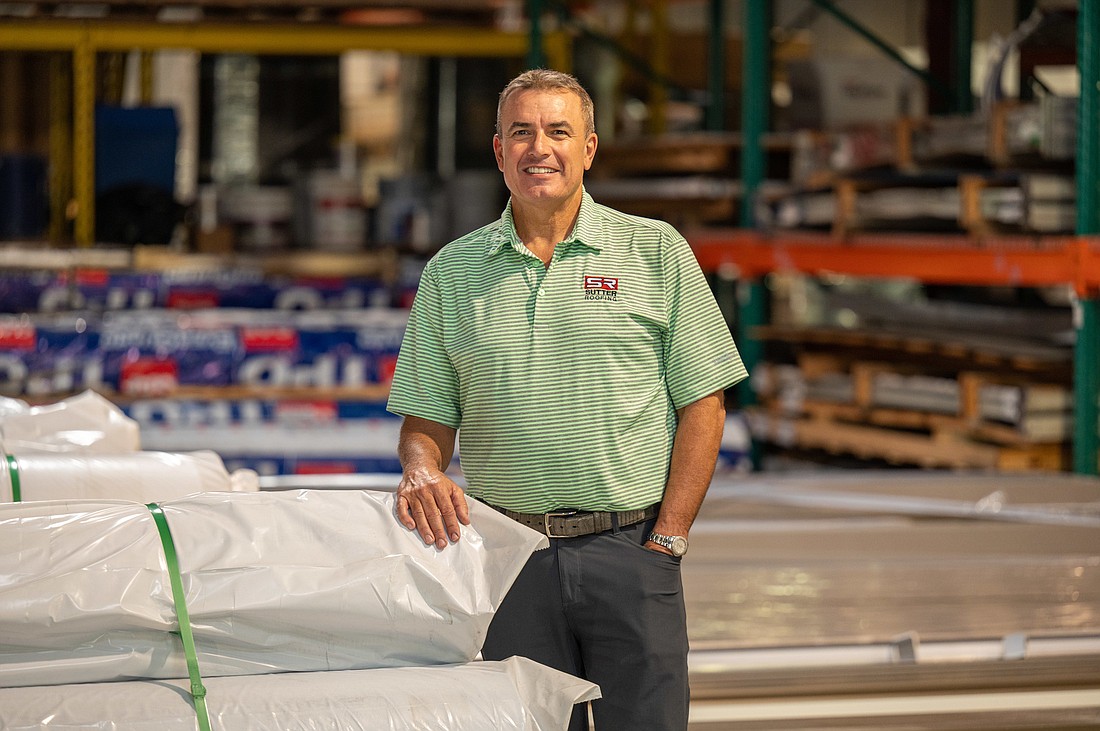- January 11, 2025
-
-
Loading

Loading

The supply chain crisis has pounded Sutter Roofing for months, much like it’s done to scores of contractors that rely on industrial materials. Deliveries that took three to six weeks now take up to six months. Prices are up 50% to 60% on everything from steel to membrane adhesives. The Sarasota-based company’s gas bill doubled in 2021 over 2020 — with basically the same driving volume.
Yet executives of the family-run business aren’t hanging by silently for the situation to solve itself. “You have to have a Plan B,” says Sutter Roofing President Doug Sutter.
A big part of the company’s Plan B is to go internal: in late February it launched a lightweight insulating concrete production facility, from manufacturers Mearlcrete and Celcore. It’s at least a $500,000 investment, including hiring a production manager, buying machines and training. Doug Sutter and his brother Brad, the firm’s executive vice president, believe it will be worth the expense.
“It will help us get vertically integrated and also help serve our customers better,” says Doug Sutter, 57. “It gives us more flexibility,” adds Brad Sutter, 53.
Executives say the lightweight insulating concrete facility, along with several other moves the company has made, have positioned it to capitalize on several opportunities to expand market share. The company has five offices in Florida, including one in Tampa and one in Fort Myers. It posted $44.7 million in revenue in 2021, up slightly, 2% over $43.8 million in 2020. The company did $53.4 million in revenue in 2019 — a figure executives predict it can get back to in the next few years, including a projected $50 million in 2022.
“We have more opportunities right now than ever before,” Doug says. “They are vey robust and very large.”
"When the supply chain stuff gets cleared up, we are really ready to takeoff." — Doug Sutter, Sutter Roofing
“When the supply chain stuff gets cleared up,” Doug adds, which he projects could be by the third or fourth quarter, “we are really ready to takeoff.”
Sutter Roofing has long been a statewide commercial leader in new roofs and roof repairs, with current projects including a reroof for Hudson High School in Pasco County and a new roof at a Baycare facility in Wesley Chapel. The firm has done work for Publix and major shopping centers in the past, and is also now doing work with cold storage facilities and condo complexes, among other clients.
The Sutter family history in roofing traces back to 1902, when C.P. Sutter, Doug and Brad’s great-grandfather, founded Sutter Roofing & Metal Co. in Clarksburg, West Virginia. Stephen Sutter, Doug and Brad’s father, moved to Florida in 1979 to start a new unit of the business.
Stephen Sutter had no local contacts when he moved to Florida, and teamed up with an Orlando roofer to work on small projects. In 1980, Tropicana hired the company for a major re-roofing project at the company's headquarters, then in Bradenton. By 1986, Sutter Roofing was based in Sarasota and getting steady work from Tropicana and several other clients with large facilities and factories. (Doug Sutter bought out Sutter Roofing & Metal Co. in 2019, after several family members, including his uncle, Dave Sutter, retired.)
Today Sutter Roofing’s Florida operations has between 250 and 275 employees. Hiring and retention, like it is for many contractors, is a core constant challenge. One advantage of late, says Brad Sutter, is the company has been on the leading edge of technological advances in roofing. That’s a selling point to land new employees, especially younger ones. “It’s not all about manual labor,” Brad says.
Doug Sutter adds the company is part of a movement among other contractors that stresses working in the trades doesn’t have to be a fallback option from a more white-collar profession. “People are starting to realize there’s more than one way to make a good living,” he says.
In addition to making its own lightweight insulating concrete — its Plan B — the pandemic also pushed the company to be even more nimble, and more responsive to unforeseen needs of employees. Several higher-ranking managers left the firm a few months into the pandemic, what the Sutter brothers term life changes exacerbated by the public health crises. “It was a scary time,” says Doug. “We had a big turnover in staff. We had to reinvent ourselves a little bit.”
For field employees, the company quickly shifted to new protocols, such as allowing employees to take home trucks, rather than arrive to and depart from a facility. It tripled PPE spending, says Brad Sutter.
With the moves to dent the impact of the supply chain slowdown underway and the staffing situation currently under somewhat control, the Sutters are excited about the rest of 2022 and beyond. “This is really our time to shine,” Brad says, “and to show everyone what we’re capable of.”